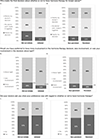Adjuvant endocrine therapy non-initiation and non-persistence in young women with early-stage breast cancer
- PMID: 36436128
- PMCID: PMC10233447
- DOI: 10.1007/s10549-022-06810-1
Adjuvant endocrine therapy non-initiation and non-persistence in young women with early-stage breast cancer
Abstract
Purpose: Characterizing oral adjuvant endocrine therapy (ET) non-initiation and non-persistence in young women with breast cancer can inform strategies to improve overall adherence in this population.
Methods: We identified 693 women with hormone receptor-positive, stage I-III breast cancer enrolled in a cohort of women diagnosed with breast cancer at age ≤ 40 years. Women were classified as non-initiators if they did not report taking ET in the 18 months after diagnosis. Women who initiated but did not report taking ET subsequently (through 5-year post-diagnosis) were categorized as non-persistent. We assessed ET decision-making and used logistic regression to identify factors associated with non-initiation/non-persistence and to evaluate the association between non-persistence and recurrence.
Results: By 18 months, 9% had not initiated ET. Black women had higher odds and women with a college degree had lower odds of non-initiation. Among 607 women who initiated, 20% were non-persistent. Younger age, being married/partnered, and reporting more weight problems were associated with higher odds of non-persistence; receipt of chemotherapy and greater hot flash and vaginal symptom burden were associated with lower odds of non-persistence. Adjusting for age and clinical characteristics, non-persistence was associated with lower odds of recurrence. Women who initiated were more likely to report shared decision-making than non-initiators (57% vs. 38%, p = 0.049), while women who were non-persistent were less likely to indicate high confidence with the decision than women who were persistent (40% vs. 63%, p < 0.001).
Conclusion: Interventions to improve ET decision-making may facilitate initiation and address barriers to adherence in young breast cancer survivors.
Trial registration: www.
Clinicaltrials: gov , NCT01468246.
Keywords: Adherence; Adjuvant endocrine therapy; Breast cancer; Non-initiation; Survivors.
© 2022. The Author(s), under exclusive licence to Springer Science+Business Media, LLC, part of Springer Nature.
Conflict of interest statement
Figures
Similar articles
-
Factors influencing 5-year persistence to adjuvant endocrine therapy in young women with breast cancer.Breast. 2024 Oct;77:103765. doi: 10.1016/j.breast.2024.103765. Epub 2024 Jul 4. Breast. 2024. PMID: 39002281 Free PMC article.
-
Psychosocial factors related to non-persistence with adjuvant endocrine therapy among women with breast cancer: the Breast Cancer Quality of Care Study (BQUAL).Breast Cancer Res Treat. 2016 May;157(1):133-43. doi: 10.1007/s10549-016-3788-x. Epub 2016 Apr 16. Breast Cancer Res Treat. 2016. PMID: 27086286 Free PMC article.
-
Survival benefits associated with being adherent and having longer persistence to adjuvant hormone therapy across up to five years among U.S. Medicare population with breast cancer.Breast Cancer Res Treat. 2023 Aug;201(1):89-104. doi: 10.1007/s10549-023-06992-2. Epub 2023 Jun 16. Breast Cancer Res Treat. 2023. PMID: 37326766
-
Patient-reported factors associated with adherence to adjuvant endocrine therapy after breast cancer: an integrative review.Breast Cancer Res Treat. 2018 Feb;167(3):615-633. doi: 10.1007/s10549-017-4561-5. Epub 2017 Nov 6. Breast Cancer Res Treat. 2018. PMID: 29110151 Review.
-
Breast cancer patients' experiences of adherence and persistence to oral endocrine therapy: A qualitative evidence synthesis.Eur J Oncol Nurs. 2020 Feb;44:101706. doi: 10.1016/j.ejon.2019.101706. Epub 2019 Nov 30. Eur J Oncol Nurs. 2020. PMID: 32007696
Cited by
-
The murine metastatic microenvironment of experimental brain metastases of breast cancer differs by host age in vivo: a proteomic study.Clin Exp Metastasis. 2024 Jun;41(3):229-249. doi: 10.1007/s10585-023-10233-7. Epub 2023 Nov 2. Clin Exp Metastasis. 2024. PMID: 37917186
-
Follow-up Routines Matter for Adherence to Endocrine Therapy in the Adjuvant Setting of Breast Cancer.Breast Cancer (Auckl). 2024 Apr 15;18:11782234241240171. doi: 10.1177/11782234241240171. eCollection 2024. Breast Cancer (Auckl). 2024. PMID: 38628960 Free PMC article.
-
Hormone Receptor Positive Breast Cancer in Young Women: A Review.J Surg Oncol. 2025 Mar;131(4):580-586. doi: 10.1002/jso.27963. Epub 2024 Oct 29. J Surg Oncol. 2025. PMID: 39470669 Free PMC article. Review.
-
Motivational Interviewing Counseling to Increase Endocrine Therapy Adherence in Diverse Patients.Cancers (Basel). 2023 Mar 25;15(7):1973. doi: 10.3390/cancers15071973. Cancers (Basel). 2023. PMID: 37046634 Free PMC article.
References
-
- Fredholm H, Magnusson K, Lindstrom LS, Garmo H, Falt SE, Lindman H, Bergh J, Holmberg L, Ponten F, Frisell J, Fredriksson I. Long-term outcome in young women with breast cancer: a population-based study. Breast Cancer Res Treat. Nov 2016;160(1):131–143. doi:10.1007/s10549-016-3983-9 - DOI - PMC - PubMed
-
- Partridge AH, Hughes ME, Warner ET, Ottesen RA, Wong YN, Edge SB, Theriault RL, Blayney DW, Niland JC, Winer EP, Weeks JC, Tamimi RM. Subtype-Dependent Relationship Between Young Age at Diagnosis and Breast Cancer Survival. J Clin Oncol. Sep 20 2016;34(27):3308–14. doi:10.1200/JCO.2015.65.8013 - DOI - PubMed
-
- Early Breast Cancer Trialists’ Collaborative G, Davies C, Godwin J, Gray R, Clarke M, Cutter D, Darby S, McGale P, Pan HC, Taylor C, Wang YC, Dowsett M, Ingle J, Peto R. Relevance of breast cancer hormone receptors and other factors to the efficacy of adjuvant tamoxifen: patient-level meta-analysis of randomised trials. Lancet. Aug 27 2011;378(9793):771–84. doi:10.1016/S0140-6736(11)60993-8 - DOI - PMC - PubMed
Publication types
MeSH terms
Substances
Associated data
Grants and funding
LinkOut - more resources
Full Text Sources
Medical



